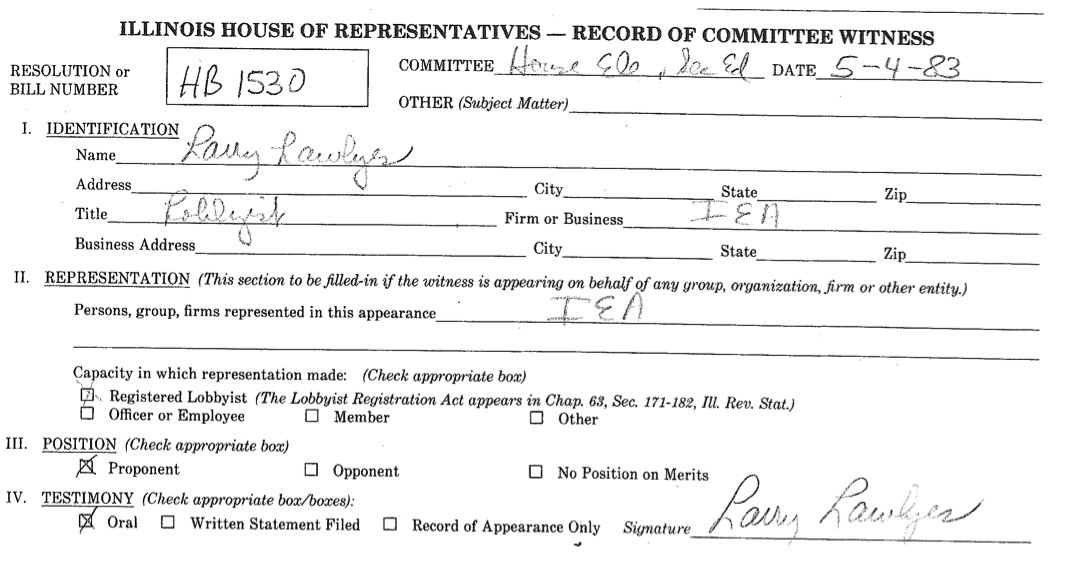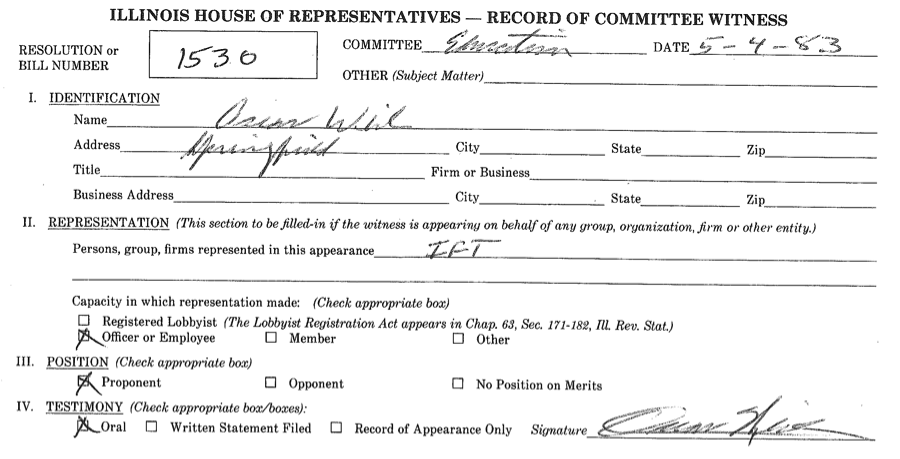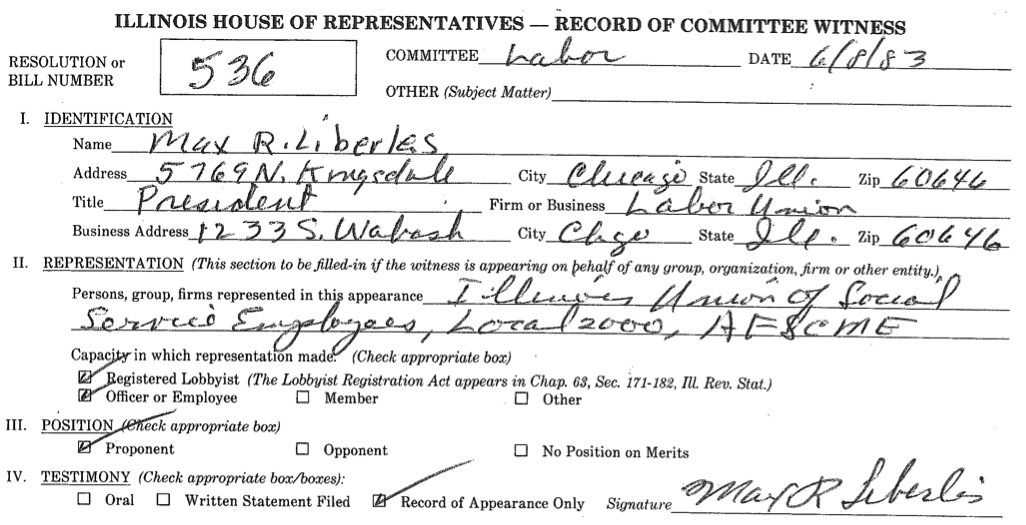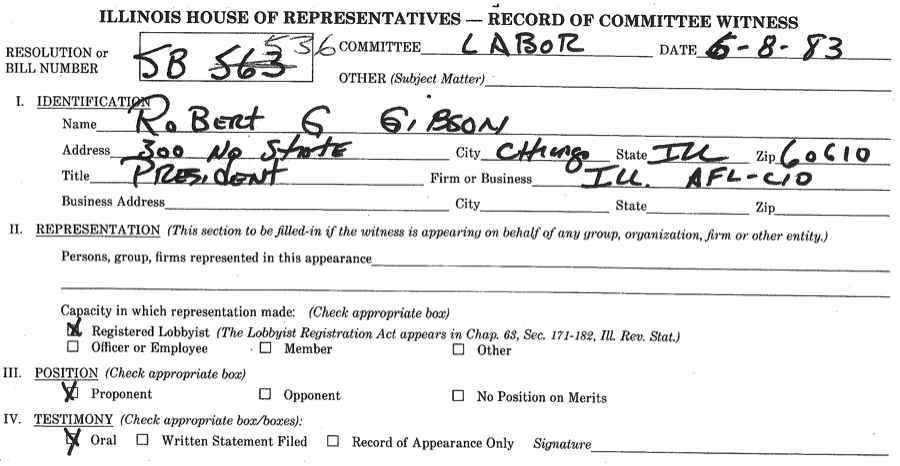Illinois unions wrote the laws they blame in ‘fair share’ debate
Unions say state law forces them to represent all government workers – even those who don’t want to belong to a union. The catch? That’s what unions asked for.
State law mandates that unions represent all workers in their bargaining unit, even if some workers do not want to be represented by a union. Government unions argue that since they are required to represent all workers, they are entitled to receive a cut of every workers’ paycheck.
But is state law really to blame for the requirement that unions represent everyone? Not exactly.
A few of the state’s biggest government unions – including the Illinois Education Association, or IEA; the Illinois Federation of Teachers, or IFT; and the AFL-CIO – wrote these laws more than 30 years ago. These groups, along with the American Federation of State and County Municipal employees, or AFSCME, then registered their support for this legislation in the Statehouse.
Fair-share fees, also known as “agency” fees, are fees paid by those public employees in a bargaining unit who do not want to join the union as members, but still benefit from collective-bargaining agreements. The fees are supposed to pay the union for the work put into collective bargaining in order to prevent so-called “free riders,” workers who receive union benefits without cost.
In defending these fees, unions have complained that “under state law … unions must provide appropriate services, including representation, to all members of a bargaining unit – union members and non-union members.” Their argument is that because a union’s hands are tied by state law that requires them to represent nonmembers, it is only “fair” that unions receive some money for providing those legally imposed services.
State laws governing public labor relations and educational labor relations do state that when a union is certified or recognized as representing the majority of employees in a bargaining unit, that union becomes the exclusive representative. The exclusive representative is then responsible for representing all employees in the bargaining unit, including those who are not members of the union.
The problem with the union claiming their hands are tied, however, is that the unions wrote the laws they now complain bind them to fair-share rules.
Both the Illinois Public Labor Relations Act, or ILPLRA, and the Illinois Educational Labor Relations Act, or IELRA, were passed by the 83rd General Assembly in 1983. A look back to the legislative history of the two acts reveals that unions did not get saddled with legal obligations to represent nonmembers against their will. Rather, they created these legal obligations at the same time they created the mechanism with which to compensate themselves for those obligations.
Like most laws, the state law that binds the unions to the structure of representing members and nonmembers alike did not appear out of thin air. Laws are drafted, filed and advocated for by stakeholders who have significant influence over the final product of a bill. In the case of state labor-relations laws, those stakeholders were the unions themselves.
A good way to get one’s preferred language into a bill is to write the bill oneself. As noted by multiple members of the Illinois House, the IEA and the IFT composed HB 1530, which would become the IELRA. SB 536, which would become the ILPRA, was primarily authored by the AFL-CIO.
Typically, individuals or groups that want to actively lobby for or against a bill will file witness slips with the committee that is discussing the bill. This “slip” indicates their position and the extent to which they want to advocate (a witness may just want to be on record in support or opposition, or they may want to give actual testimony about the bill’s contents and merits).
The IEA and IFT both “slipped” repeatedly as witnesses, and gave oral testimony as proponents of HB 1530.
AFSCME and AFL-CIO conducted similar advocacy on behalf of SB 536.
The active union role behind these bills was also recognized outside of committee. In floor debates over SB 536, former state Sen. George Hudson berated the structure that the bill set up, describing it as a union “recruitment drive” that requires employees to pay a “forced share,” whether they “want to be a part of a union or not.”
The IEA, in fact, was so influential in the creation and passage of HB 1530, that then-Gov. Jim Thompson signed the bill at the union’s event.
If a union wants to defend the policy of forcing nonmembers to be represented by the union and then forcing them to pay for it, that is its prerogative. But to use state law written and tirelessly promoted by the unions themselves as a scapegoat – and “fairness” as a rallying cry – for addressing the issues the law creates is disingenuous.




